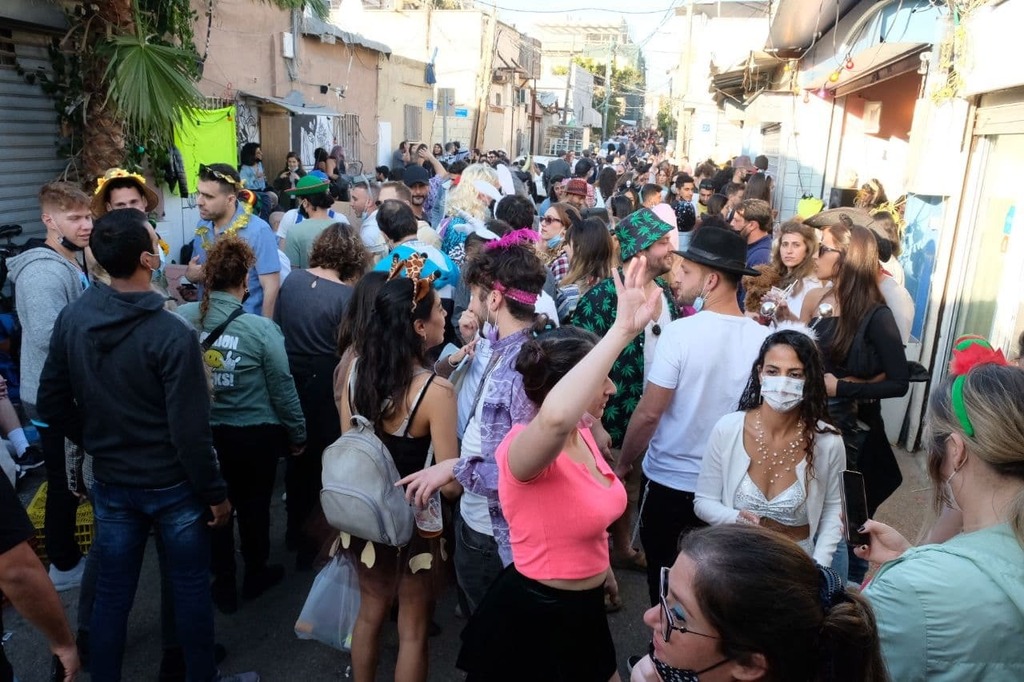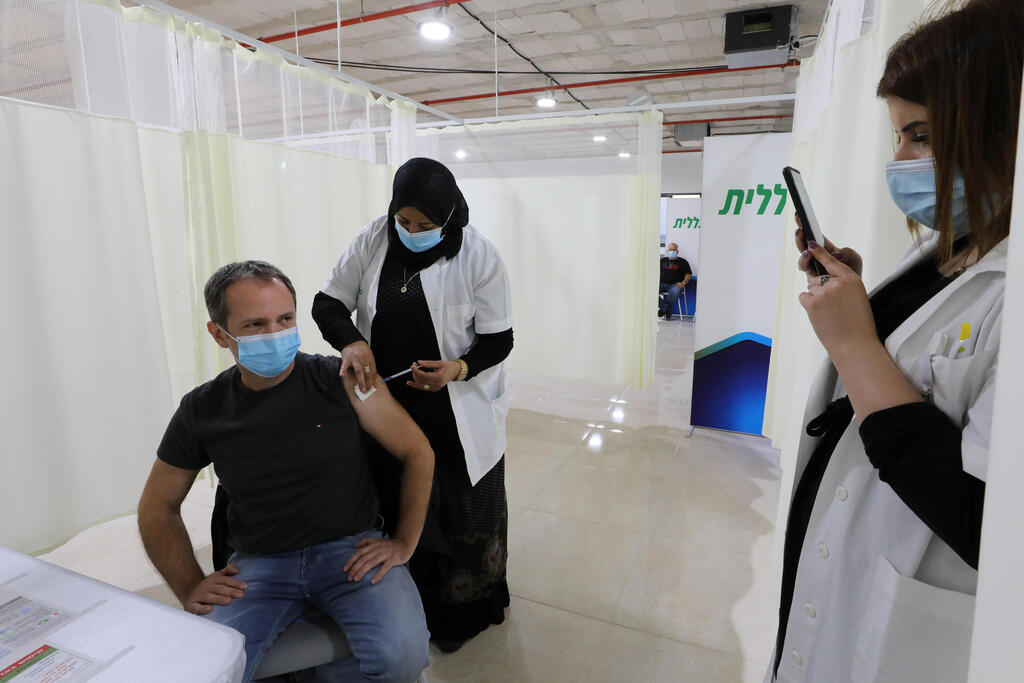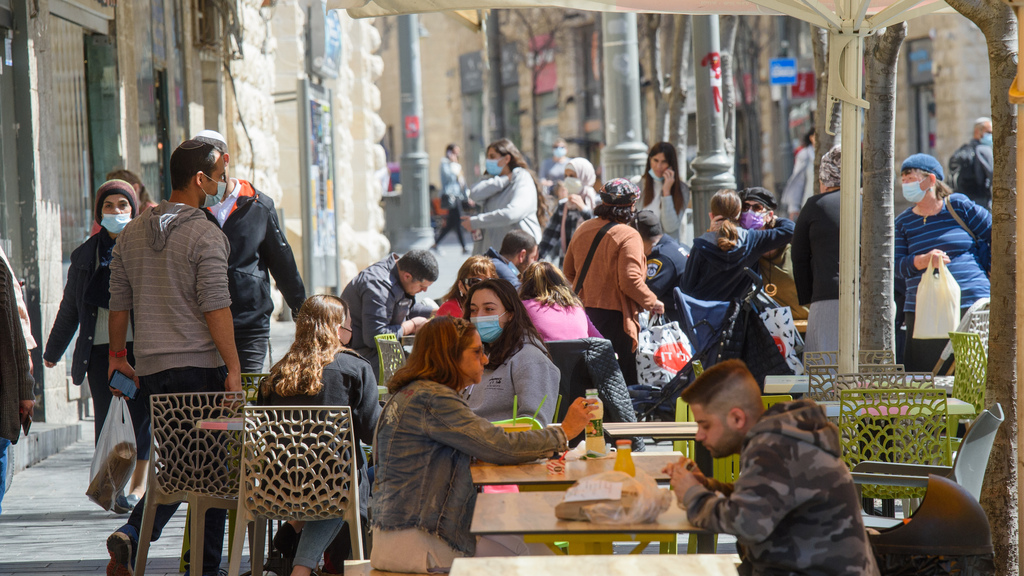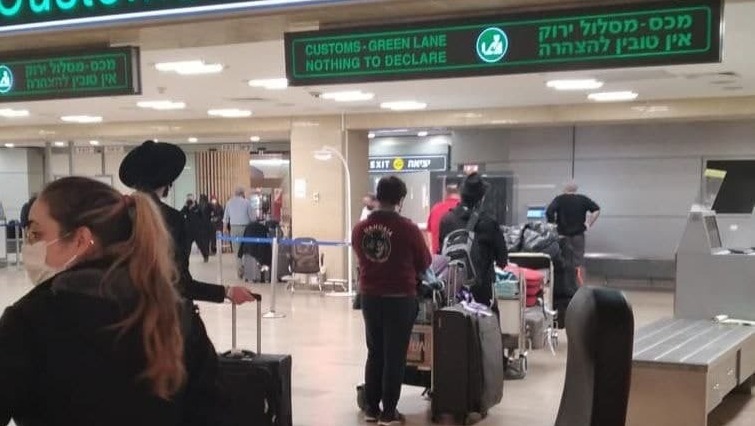The head of Israel's national coronavirus response center expressed optimism Tuesday that the country had apparently managed to avoid a surge in coronavirus infections following the Purim holiday at the end of February.
Tomer Lotan said that there has been a substantial decrease in the country's reproduction (R) number, which indicates how many other people someone who carries the virus has infected, despite widespread Purim celebrations that violated health regulations.
5 View gallery


A Purim party held in Tel Aviv's Carmel market in violation of health regulations
(Photo: Shaul Golan)
"Our R number currently stands at 0.95, exactly 10 days after Purim. We were afraid of a higher number at this point, and when I saw that number today I calmed down a bit," Lotan said.
According to Lotan, the decrease is even more impressive given recent steps to reopen large swathes of the country's economy and education system, both of which could have had an adverse impact on Israel’s infection rate.
"We would have expected, should any significant outbreak occur, to see some sort of upward trend in this 10-day period. And yet in the last two days in particular we have seen the R number begin to decline," he said.
Lotan said the success of Israel’s vaccination campaign and the subsequent fall in the country’s R number means that the severity of the pandemic in Israel will now be measured by the number of patients in serious or critical condition.
As well as a decrease in the R number, Israel saw the percentage of positive tests drop Monday to 4%.
The number of patients in serious condition has also decreased to 668, while the average daily COVID death toll has also dropped to 20 compared to 25 at the beginning of March.
“There is no doubt that the country’s number of seriously ill patients will dictate policy decisions going forward," Loan said.
"This includes restrictions, closures and so on. Currently though we are on a downward trend. Our overall direction is good,” he said.
“As for the R number, it serves as a great mirror to the disease. It gives us all the information we need to know - the effects of the mutations, the impact of the vaccines and public behavior,” Lotan said.
“Overall it provides us with a clear picture of if the pathogen is in an upward or downward trend.”
Despite the drop in the spread of the coronavirus among the overall population, a spike has been seen in the Arab community as well as a lower number of people who have been vaccinated compared to the rest of the country.
5 View gallery


Administering the coronavirus vaccine in the predominantly Arab city of Umm al-Fahm in northern Israel
(Photo: Reuters)
“It is true that Arab society is perhaps the biggest challenge regarding vaccines, and it is also divided within itself. We have East Jerusalem, the Bedouin society. These are the main 'pockets' of difficulty regarding the vaccines,” Lotan said.
“We have a major control center within Magen Israel [the national pandemic response center] that does vigorous work with the authorities and the Arab public. In the last two or three weeks, there has been a significant increase in the rate of immunization in Arab society. This is the result of targeted activities done in collaboration with local Arab leadership.”
Lotan also echoed concerns among Israel’s medical professionals that the decision to fully reopen Ben-Gurion Airport will lead to the entry and spread of more variants of the coronavirus.
“Ben-Gurion Airport is undoubtedly our Achilles heel when it comes to this disease,” Lotan said.
“Although the protective layers at Ben-Gurion Airport have improved significantly, alongside the isolation measures for returnees, there is no doubt that the airport is our weak spot.”
Lotan did however defend the government decision to allow thousands to return to Israel ahead of the March 23 Knesset elections as "a legitimate one."




